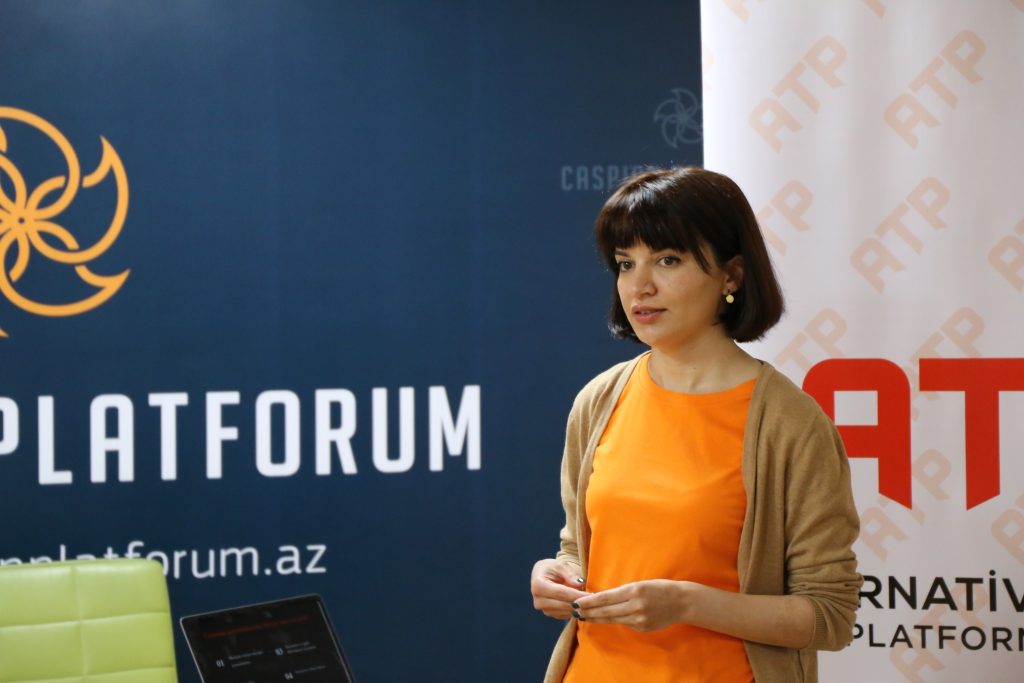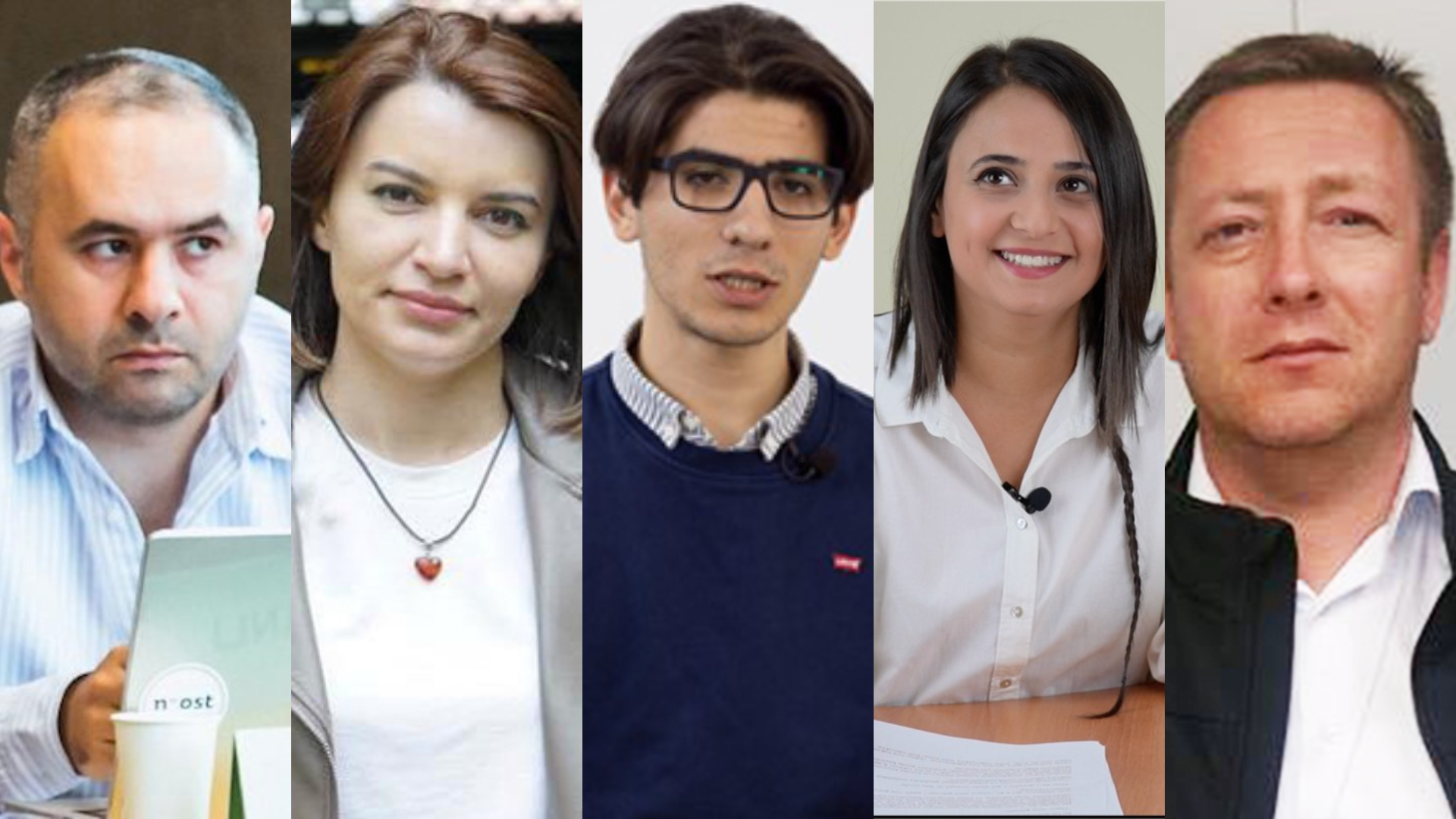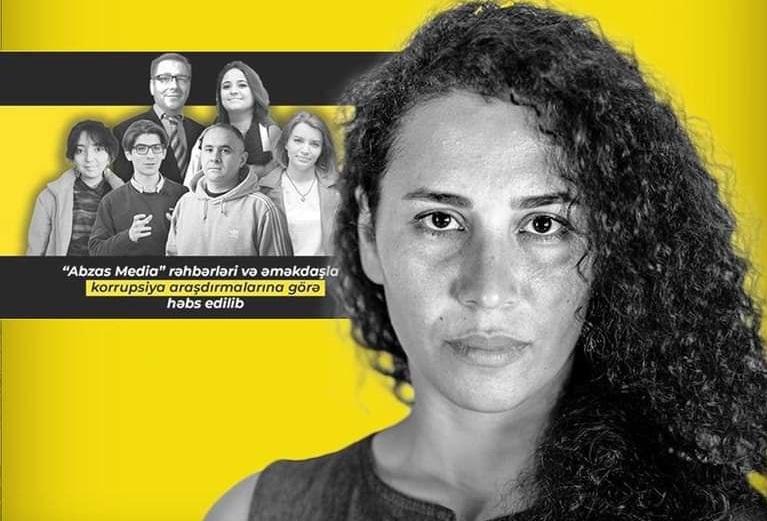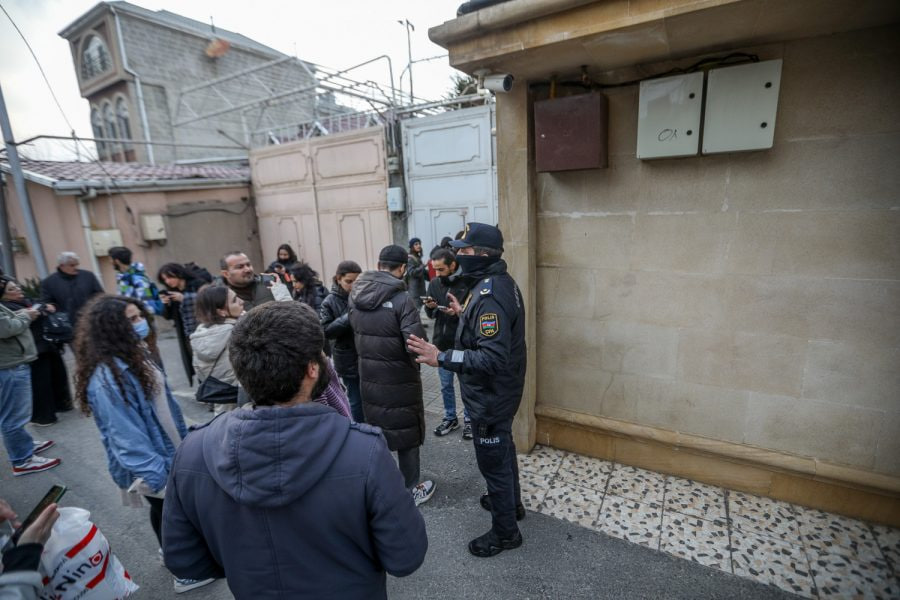There's a rising trend of arresting female journalists in Azerbaijan
Female journalists arrested in Azerbaijan
Nijat Amiraslanov came back from the local store loaded with bags. He’s preparing a care package for his wife, journalist Elnara Gasimova, currently in detention.
He explains, “On Mondays and Tuesdays, after the lawyer visits Elnara and finds out what she needs, I start putting it all together. By Wednesday and Thursday, I’m buying everything on the list – vegetables, groceries, whatever she needs.
I gather everything by Thursday, then I package it all up at home. Finally, I make a detailed list of each item.”
The Abzas media case
Elnara Gasimova is the sixth employee of the independent online outlet Abzas Media to be arrested.
Between November 20, 2023, and January 13, 2024, the media’s director Ulvi Hasanli, deputy director Mahammad Kekalov, chief editor Sevinj Vagifgizi, investigative journalist Hafiz Babali, reporters Nargiz Absalamova, and Elnara Gasimova were arrested.
A court has ordered them to be detained for the duration of the preliminary investigation. They are charged with smuggling in a premeditated conspiracy with a group of individuals.
Under this charge, the Abzas Media employees face imprisonment ranging from five to eight years.
Elnara Gasimova — “She went to the interrogation prepared for arrest”

28-year-old journalist Elnara Gasimova, born in Baku, has primarily covered social and political issues in her career. Her husband, Nijat Amiraslanov, is also a journalist. Married since 2017, the couple has long shared the same viewpoints and the challenges that come with them.
“It’s difficult for independent journalists to work in Azerbaijan,” Nijat explains. “There’s violence everywhere you try to report. We’re prevented from doing our job. At protests, they chase and beat us. Elnara was once taken to a police station after which we lodged a complaint. There, the police chief insulted her. Our profession is fraught with difficulties.
However, we don’t see these challenges as obstacles. I’ve been detained for 24 hours multiple times and have faced torture. Elnara knew the risks involved. We both chose this path knowingly. We understood from the start that arrests and torture might happen. But we must proceed. Someone has to take this path,” Nijat says.

He explains that Elnara’s arrest did not come as a surprise to them:
“The day before her arrest, on January 12, when the investigator called and summoned Elnara to the Baku City Police Department as a witness, we were already certain she would be arrested. Because Nargiz had been called in as a witness for the second time and was arrested in the same manner. So, Elnara packed her things, wrapped up all her work, and told me what needed to be done.”
Elnara and her colleagues say the arrests are linked to their journalistic work, particularly investigations into corruption among high-ranking officials and their relatives, published by Abzas Media, where they work.
Abzas Media has published some of the most significant journalistic investigations in Azerbaijan in recent years.
After the arrest of the entire leadership and journalists of Abzas Media, the investigations continue as part of the “Baku Connection Forbidden Stories” project, which brings together 15 media organizations from different countries.
Media rights expert and lawyer Khalid Agaliyev says that there has never been such a mass arrest of journalists before:

Lawyer Khalid Agaliyev states, “If we compare the cases of journalist arrests over the last three to five months, for example, with the period since 2000, we’ve never seen anything like this. Between 2005 and 2010, Azerbaijan held the top spot in the OSCE region for the number of journalists imprisoned. At that time, many journalists were in jail. But even if we look at the arrest statistics from those years, the current situation is still worse, with more journalists behind bars.”
Over different years, Azerbaijan has periodically arrested independent journalists. International and local human rights organizations have recognized them as “political prisoners.” However, for many years, female journalists were spared this fate. Until 2014, not a single female journalist had been arrested in Azerbaijan.
The first arrest of a female journalist in Azerbaijan occurred in 2014. This trend was broken on December 5, 2014, with the arrest of well-known investigative journalist Khadija Ismayilova.
The journalist, charged under several articles of the Criminal Code, including illegal entrepreneurship and tax evasion, was sentenced to seven years and six months in prison with a condition not to hold any managerial positions for three years.
More than two years later, the Supreme Court, based on a cassation appeal, replaced the remaining part of Khadija Ismayilova’s sentence with a suspended sentence of three and a half years and released her.

Recently, she was summoned for questioning regarding the case of Toplum TV, where she has been the editor-in-chief since 2022. Relatives and colleagues fear another arrest.
After the case against Abzas Media, a criminal case was initiated against the independent online television Toplum TV. Seven people have already been arrested in connection with this case, and two more are under police surveillance. All are charged with smuggling, similar to the Abzas Media case.
“It doesn’t matter to them anymore who works there – men or women”
Nearly ten years have passed since the arrest of Khadija Ismayilova, and currently, three female journalists, all from the same editorial team, are in prison.
Authorities no longer care whether the journalists obstructing them are men or women, according to human rights defender Rasul Jafarov.

“These arrests are meant to halt the operations of Abzas Media. It doesn’t matter who is working in the editorial office—women or men. The most effective way to stop the editorial work is to isolate everyone involved. And the classic form of isolation is imprisonment,” says Jafarov.
According to Khalid Agaliyev, this is also aimed at intimidating women, who have recently become more prominent in independent journalism, and deterring them from this activity.
“If we pay attention, we’ll notice that among critical journalists, women are more conspicuous. Whether it’s gathering and disseminating information about protests in Baku or looking at who is leading various programs, I believe that female journalists are more visible in this context. It’s likely that the arrest of female journalists and increased pressure on them is intended to intimidate them,” Agaliyev explains.
Nargiz Absalamova broke her collarbone as a result of police violence

Nargiz Absalamova is also one of the Abzas Media employees who has been arrested.
Born on July 17, 1998, in Baku, she graduated from the journalism faculty of Baku State University.
She began her professional career as a journalist in 2018 and has been collaborating with Abzas Media since 2021.
In December 2021, Absalamova was subjected to police violence when independent journalists were protesting against the new “Media Law” in front of the Milli Majlis (the national assembly), resulting in a fractured collarbone. Absalamova underwent complex surgery and had to take a break from work for some time.
Although she sought justice in Azerbaijani courts, her complaint about the inhumane treatment by police officers was not upheld.
On November 30, 2023, Nargiz Absalamova was detained when she was called to the Main Police Department of Baku City for the second time to give testimony in the Abzas Media case. She is also charged with group smuggling.
She denies the charge, asserting that her arrest was related to her professional activities, similar to her colleagues.
Sevinj Vagifgizi – “She might not have returned”

When Abzas Media’s director Ulvi Hasanli and his deputy Mahammad Kekalov were arrested, chief editor Sevinj Vagifgizi was abroad. Despite her family and colleagues advising her not to return to Azerbaijan for her safety, Vagifgizi stated in a video recorded at Istanbul airport, “I cannot comfortably live abroad while my friends are in jail back home; that would be a living hell for me.” She then returned to Baku and was detained right at the airport just after disembarking from the plane on the night between November 20 and 21.
Sevinj Vagifgizi was born on July 5, 1989, in the Fizuli District. She was forced to flee her home with her family in August 1993 due to the occupation of her native district during the First Karabakh War. She later graduated from the journalism department of Baku State University.
Having worked for many years in independent and critical media, Vagifgizi has faced multiple detentions by police and various forms of persecution throughout her career.
In 2016, as part of a criminal case against “Meydan TV,” which she was collaborating with, she and other colleagues were issued a travel ban. It took her five years to overturn this ban.
She was sued for publishing a video that exposed fraud in the 2018 presidential elections. The nearly four-year-long court case ultimately concluded in the journalist’s favor.
Sevinj Vagifgizi is among the journalists, politicians, and public figures that the Azerbaijani authorities have allegedly monitored using the Pegasus spyware.
“After the arrests of Sevinj, Elnara, and Nargiz, being arrested isn’t as frightening anymore”

“After journalist Ulvi Hasanli’s arrest, many wondered, ‘Will Sevinj return?’ But I never doubted it. Those who know her were confident she didn’t even consider not returning,” says Aytaj Tapdyg, an independent journalist who, like Sevinj Vagifgizi, was implicated in the Meydan TV criminal case, faced repeated interrogations, and was long barred from leaving the country.
She reflects that Sevinj Vagifgizi’s arrest, while shocking, did not leave her disheartened:
“It’s heartbreaking that Sevinj was arrested, but this sadness doesn’t translate to inaction or surrender. Contrary, Sevinj Vagifgizi’s return to the country, despite the threat of arrest, her unwavering stance, and her diligent work serve as inspiration for us to persist in our path. In essence, after the arrests of Sevinj, then Elnara, and Nargiz, many of us have become less afraid of being arrested.”
International reaction vs. the Azerbaijani government’s confidence
After the recent spate of journalist arrests, several international human rights organizations have urged the Azerbaijani government to free the journalists and treat them humanely. The official response from Baku was to recommend that these organizations refrain from meddling in the nation’s internal matters.
For instance, Peter Michalko, the Head of the European Union’s mission to Azerbaijan, expressed on his X social media account his horror at the humiliating treatment of the newly arrested journalists in Azerbaijan, particularly distressed by reports of young women being handcuffed, put into a glass cage in the courtroom, or denied their basic human needs.
Aikhan Hajizade, a spokesperson for the Azerbaijani Ministry of Foreign Affairs, labeled Michalko’s remarks as “baseless and irresponsible.”
“Hajizade suggested, “The ambassador would do better to concentrate on the injustices and poor treatment in the judicial systems of some European countries. Interference in Azerbaijan’s judicial system, which is founded on the best international practices, is unacceptable,” he stated.
Media expert Khalid Agaliyev believes that the Azerbaijani government’s response to international calls has significantly changed from the past:
“10-15 years ago, the government was more responsive to international organizations’ calls regarding the arrest of any journalist, and it was possible to achieve certain progress in such cases. But now, the government typically does not respond to calls related to recent arrests. It simply tries to justify the arrest of journalists.”
Human rights defender Rasul Jafarov says that Azerbaijani authorities deflect responsibility by framing international challenges as a sort of “attempt to interfere in internal affairs.”
“But the fact is that human rights are not an internal matter,” emphasizes Jafarov.
Journey to Kurdakhany
Today is Friday. The handover of packages to inmates at the Baku Detention Center, colloquially known as “Kurdakhany prison,” starts at 09:00 AM. Therefore, Nijat Amiraslanov leaves his house at 08:00 AM. With the help of a taxi driver who was waiting outside his home, he loads the items he prepared yesterday into the trunk of the car. He has been making this trip to the detention center every week for the past two months.

“It’s about 20 kilometers from my house to the detention center. We usually get there around 10 AM. The whole process takes at least 3-4 hours, up to one or two PM. But what can you do? We have no other choice. We have to go. We traveling there and back every week,” he explains.
As Nijat approaches, he repeatedly checks the list. He can’t afford to forget anything necessary, or else he’ll have to wait another whole week.
“Stop here, I’ll buy some fresh bread,” Nijat tells the driver, pointing to one of the nearby stores selling tandoor-baked bread close to the detention center.
Returning to the car, he places the list in one of the bags with groceries. This is so Elnara can check that all the items she needs have made it to her.
Supported by Media Network






















